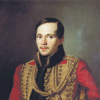Mikhail Lermontov

Mikhail Lermontov
Mikhail Yuryevich Lermontovwas a Russian Romantic writer, poet and painter, sometimes called "the poet of the Caucasus", the most important Russian poet after Alexander Pushkin's death in 1837 and the greatest figure in Russian Romanticism. His influence on later Russian literature is still felt in modern times, not only through his poetry, but also through his prose, which founded the tradition of the Russian psychological novel...
NationalityRussian
ProfessionPoet
Date of Birth15 October 1814
CountryRussian Federation
A strange thing, the human heart in general, and woman's heart in particular.
I was lying, but I wanted to rouse him. I have an inborn urge to contradict; my whole life has been a mere chain of sad and futile opposition to the dictates of either heart or reason. The presence of an enthusiast makes me as cold as a midwinter's day, and, I believe, frequent association with a listless phlegmatic would make me an impassioned dreamer.
In simple hearts the feeling for the beauty and grandeur of nature is a hundred-fold stronger and more vivid than in us, ecstatic composers of narratives in words and on paper.
I have a congenital desire to contradict; my whole life is merely a chain of sad and unsuccessful contradictions to heart and mind. When faced with enthusiasm, I am seized by a midwinter freeze, and I suppose that frequent dealings with sluggish phlegmatics would have made a passionate dreamer.
Afraid of decision, I buried my finer feelings in the depths of my heart and they died there.
I am like a mariner born and bred on board a buccaneer brig whose soul has become so inured to storm and strife that if cast ashore he would weary and languish no matter how alluring the shady groves and how bright the gentle sun.
Out of life's storm I carried only a few ideas - and not one feeling.
Love, like fire, goes out without fuel.
I was modest--they accused me of being crafty: I became secretive. I felt deeply good and evil--nobody caressed me, everybody offended me: I became rancorous. I was gloomy--other children were merry and talkative. I felt myself superior to them--but was considered inferior: I became envious. I was ready to love the whole world--none understood me: and I learned to hate.
It is sad to see a young man's fondest hopes and dreams shattered when the rose-colured veil is plucked away and he sees the actions and feelings of men for what they are. But he still has the hope of replacing his old illusions with others, just as fleeting, but also just as sweet.
Happy people are ignoramuses and glory is nothing else but success, and to achieve it one only has to be cunning.
When we retire from the conventions of society and draw close to nature, we involuntarily become children: each attribute acquired by experience falls away from the soul, which becomes anew such as it was once and will surely be again.
One should never spurn a penitent criminal: in his despair he may become twice as much a criminal as before.
In people's eyes I readPages of malice and sin.